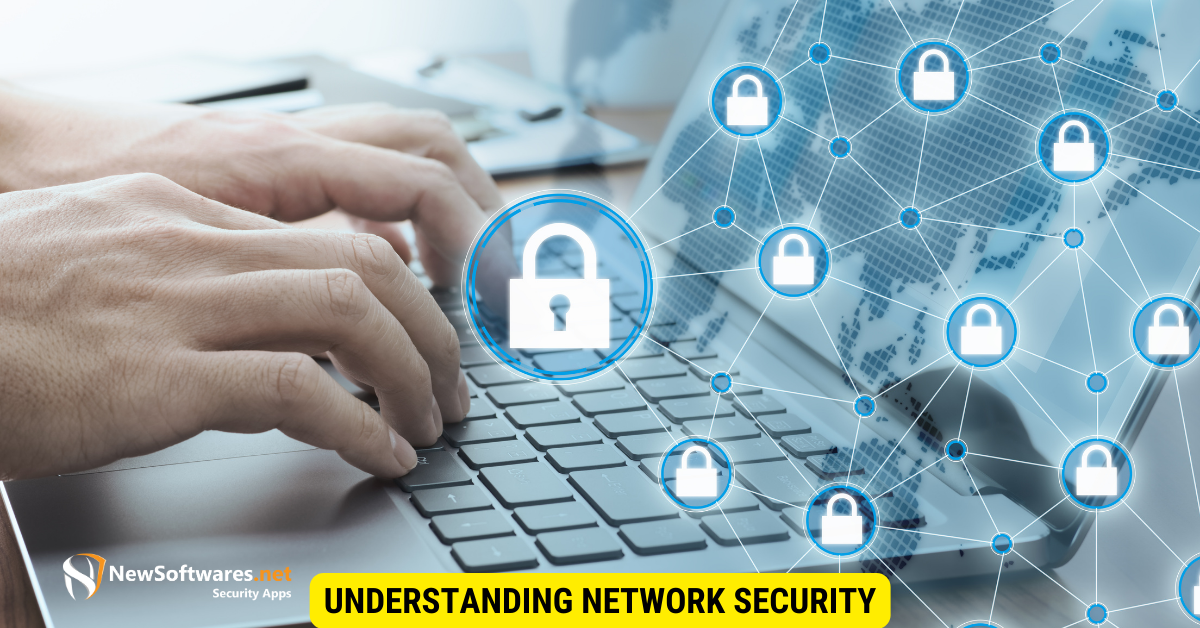NCN Data’s network is designed with multiple layers of security to prevent illegal access and data breaches.
NCN Data’s network security is crucial to protecting sensitive information and ensuring data confidentiality, integrity, and availability. Understanding network security and the measures in place is vital for organizations to safeguard their systems against threats and attacks. Together, we will explore the importance of network security, the architecture of NCN Data’s network, the threats it faces, the security policies and procedures in place, and the ongoing evaluations conducted to maintain the network’s security posture.
Understanding Network Security

Network security prevents illegal access, misuse, disruption, or modification of a network and its resources. It involves implementing various technologies, processes, and policies to secure the network infrastructure, data, and communication channels against potential risks and attacks.
The Importance of Network Security

Network security is essential for several reasons. Firstly, it protects sensitive data from unauthorized access or theft. With increasing data breaches and cyber threats, organizations must prioritize securing their networks to avoid potential financial and reputational damage.
Moreover, network security ensures the availability and reliability of network resources. By implementing robust security measures, organizations can minimize the risk of network downtime and ensure uninterrupted business operations.
Additionally, network security plays a crucial role in safeguarding the privacy of individuals and organizations. It helps maintain the confidentiality of sensitive info, such as personal data, financial records, and intellectual property, by preventing unauthorized individuals or entities from accessing it.
Basic Concepts of Network Security
There are key concepts that underpin network security:
1. Confidentiality: Keeping data private and accessible only to authorized individuals or entities.
Confidentiality is a fundamental aspect of network security. It involves implementing encryption techniques and access controls to safeguard that sensitive data remains confidential and protected from unauthorized access. By encrypting data, organizations can prevent unauthorized individuals from intercepting and deciphering the information.
2. Integrity: Ensuring data remains unaltered and free from unauthorized modifications.
Data integrity is crucial in network security, ensuring that information remains accurate, consistent, and trustworthy. Organizations use various methods, such as checksums and digital signatures, to detect and prevent unauthorized modifications to data. Organizations can rely on the accuracy and reliability of the information they store and transmit by maintaining data integrity.
3. Authentication: Verifying the identity of users or devices before granting access to the network.
Verification is verifying the identity of individuals or devices before granting them access to the network. It involves using usernames, passwords, biometrics, or digital certificates to ensure that only authorized entities can access the network resources. Organizations can prevent illegal individuals from accessing sensitive information and resources by implementing strong authentication mechanisms.
4. Authorization: Granting specific privileges or permissions to authorized individuals or devices within the network.
Authorization is granting specific privileges or permissions to authorized individuals or devices within the network. It safeguards that users can only access the resources and perform necessary actions for their roles or responsibilities. By implementing proper authorization controls, organizations can prevent illegal access to sensitive data and limit the potential damage caused by insider threats.
5. Availability: Ensuring network resources are accessible and operational when needed.
Availability is critical to network security, as it ensures that network resources are accessible and operational when needed. Organizations implement measures such as redundancy, load balancing, and disaster recovery plans to minimize the danger of network downtime and ensure uninterrupted service. Organizations can maintain productivity, customer satisfaction, and business continuity by ensuring availability.
The Architecture of NCN Data’s Network
NCN Data has designed and implemented a robust network architecture that prioritizes security and performance. This architecture has been carefully crafted to meet the organization’s operational needs while ensuring the utmost protection against potential threats.
Network Design and Infrastructure
The network has been meticulously designed to support the organization’s operations effectively. It encompasses a comprehensive infrastructure that combines cutting-edge technologies and industry best practices. With multiple layers of security and redundancy measures in place, the network is highly efficient and remarkably resilient to potential threats, offering uninterrupted availability.
Security Measures in Place
NCN Data takes network security seriously and has executed a range of measures to protect its infrastructure and the valuable data it holds. These measures include:
- Firewalls: The network is fortified with advanced firewalls acting as the first defense line. These firewalls can filter network traffic, identify potential threats, and block unauthorized access attempts. By constantly monitoring and analyzing incoming and outgoing traffic, the firewalls establish only legitimate and authorized connections.
- Intrusion Detection Systems (IDS): NCN Data’s network is equipped with state-of-the-art Intrusion Detection Systems that continuously monitor network traffic for any signs of doubtful activity. These systems employ sophisticated algorithms and pattern recognition techniques to detect threats like unauthorized access attempts, malware, or unusual network behavior. Upon detecting such activities, the IDS promptly alerts the network administrators, enabling them to take immediate action and mitigate potential risks.
- Virtual Private Networks (VPNs): To ensure secure remote access to the network for authorized users, NCN Data has implemented Virtual Private Networks. These VPNs create an encoded tunnel between the user’s device and the network, safeguarding the confidentiality and integrity of the data communicated over the internet. Using strong encryption protocols, VPNs provide a secure and private connection, even when accessing the network from remote locations or public Wi-Fi networks.
- Encryption: NCN Data employs robust encryption techniques to secure the transmission of sensitive information across its network. By encrypting data, the organization ensures that the information remains unreadable and unusable to unauthorized individuals, even if intercepted. This extra layer of security significantly decreases the risk of data breaches and unauthorized access.
With these comprehensive security measures in place, NCN Data’s network stands as a fortress, safeguarding the organization’s critical assets and ensuring its data’s confidentiality, integrity, and availability. The combination of cutting-edge technologies, rigorous monitoring, and proactive security measures makes NCN Data’s network architecture a model of excellence in the industry.
Threats to Network Security

Despite the robust measures, NCN Data’s network faces various threats that require constant vigilance and proactive measures to mitigate the risks.
Common Network Vulnerabilities
Some common network vulnerabilities that organizations, including NCN Data, must address are:
1. Weak Or Easily Guessable Passwords
One of the most common network vulnerabilities is using weak or simply guessable passwords. This can leave the network susceptible to brute force attacks, where hackers systematically try different combinations of passwords until they gain access. Organizations like NCN Data must enforce strong password policies and educate employees about the importance of using unique and complex passwords.
2. Unpatched Or Outdated Software
Another significant network vulnerability is the use of unpatched or outdated software. Software vendors regularly publish updates and patches to fix security vulnerabilities. Failure to apply these updates can leave the network exposed to known exploits. NCN Data must have a robust patch management process to ensure all software and systems are updated with the newest security patches.
3. Malware And Phishing Attacks
Malware and phishing attacks pose a significant threat to network security. Malware can be introduced into the network through infected email attachments, malicious websites, or compromised software. Phishing attacks, conversely, involve tricking users into revealing sensitive info, such as passwords or credit card niceties, through deceptive emails or websites. NCN Data must implement robust antivirus and anti-malware solutions and educate employees about the dangers of phishing and how to identify suspicious emails or websites.
Insider threats refer to the risks modeled by individuals within the association who have authorized access to the network. These individuals may intentionally or unintentionally misuse their privileges to compromise network security. NCN Data must have strict access controls in place, regularly monitor user activities, and provide ongoing training to staff to raise awareness about the potential risks associated with insider threats.
5. Unsecured Or Misconfigured Network Devices
Network policies, such as routers, switches, and firewalls, can also be vulnerable if they are unsecured or misconfigured. Default passwords, weak encryption, or misconfigured access control lists can provide an entry point for attackers. NCN Data must ensure that all network devices are properly configured, have strong passwords, and are regularly audited for security vulnerabilities.
Potential Risks and Attacks
There are numerous potential risks and attacks that organizations face, such as:
- Distributed Denial of Service (DDoS)
A Distributed Denial of Service (DDoS) spell is a malicious effort to disrupt the usual functioning of a network, service, or website by devastating it with a flood of internet traffic. These attacks can render a network or service unavailable to legitimate users. Organizations like NCN Data must have robust DDoS mitigation strategies to detect and mitigate such attacks, ensuring the continuity of their services.
- SQL Injection
SQL Injection is a spell where an attacker exploits vulnerabilities in a web application’s database layer to manipulate the underlying SQL queries. This can allow the attacker to access sensitive data illegally or modify the database contents. Organizations must implement proper input validation and parameterized queries to prevent SQL Injection attacks.
- Man-in-the-middle attacks
A Man-in-the-middle (MITM) attack occurs when an attacker interrupts a message between two parties and can eavesdrop, adapt, or inject malicious content into the communication. This can lead to the theft of complex info or the unauthorized manipulation of data. Organizations like NCN Data must implement strong encryption protocols, such as Transport Layer Security (TLS), to prevent MITM attacks and regularly update their cryptographic algorithms.
- Social engineering
Social engineering is a method used by attackers to operate individuals into revealing sensitive information or performing actions that compromise network security. This can include tactics such as impersonation, phishing, or pretexting. Administrations must educate their employees about social engineering techniques and implement strict security policies to minimize the danger of falling victim to such attacks.
- Data breaches
Data breaches involve unauthorized access to sensitive info, such as customer data, intellectual property, or financial records. These breaches can result in significant monetary losses, reputational damage, and legal consequences. Organizations must implement robust data protection measures, including encryption, access controls, and regular security audits, to prevent and detect data breaches.
NCN Data’s Security Policies and Procedures
NCN Data has established comprehensive security policies and procedures to ensure proper governance and minimize security risks.
Security Policy Framework
The security policy framework defines guidelines and rules for the secure usage of network resources and outlines the responsibilities of employees in maintaining network security.
Incident Response and Management
In the occasion of a security incident or breach, NCN Data has established an incident response plan to minimize the impact and ensure a timely and effective response. This plan includes incident detection, containment, eradication, and recovery procedures.
Evaluating NCN Data’s Network Security
Ensuring the effectiveness of network security measures is an ongoing process at NCN Data.
Security Assessment and Audits
Regular security assessments and audits evaluate the network’s overall security posture. These assessments involve vulnerability scans, penetration testing, and a review of security controls.
Ongoing Security Monitoring and Maintenance
NCN Data employs proactive security monitoring techniques to detect suspicious activities, unauthorized access attempts, or signs of compromise. Continuous monitoring allows for immediate response and remediation when required.
Key Takeaways
- NCN Data uses advanced encryption protocols to ensure data integrity.
- Regular security audits and assessments are conducted.
- Multi-factor authentication is in place for network access.
- The company employs the latest intrusion detection systems.
- They have a dedicated security team monitoring the network 24/7.
FAQs
Q: How often does NCN Data conduct security audits?
A: Regularly, with both scheduled and surprise audits.
Q: Does NCN Data’s network have DDoS protection?
A: Yes, they employ advanced DDoS protection mechanisms.
Q: How does NCN Data handle a security breach?
A: They have an incident response plan that is activated immediately upon detection of a breach.
Q: Do they offer secure access for remote employees?
A: Yes, they utilize VPNs and multi-factor authentication for remote access.
Q: Is data backed up securely by NCN Data?
A: Absolutely, they implement both onsite and offsite secure backups.
Conclusion
In conclusion, NCN Data recognizes the importance of network security and has implemented a strong network architecture and security measures to protect its systems. However, the ever-evolving threat landscape necessitates ongoing evaluations, regular assessments, and proactive monitoring to maintain the network’s security integrity. By prioritizing network security and adhering to robust policies and procedures, NCN Data can enhance its overall security posture and effectively safeguard its valuable data and resources.
